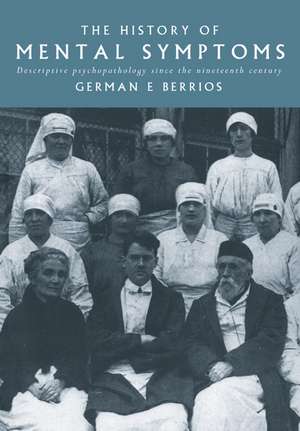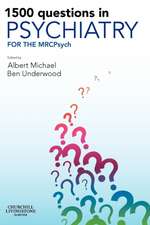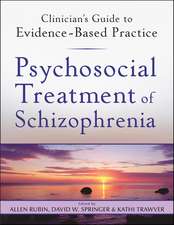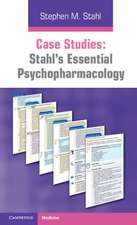The History of Mental Symptoms: Descriptive Psychopathology since the Nineteenth Century
Autor German E. Berriosen Limba Engleză Paperback – 10 apr 1996
Preț: 1507.14 lei
Preț vechi: 1586.47 lei
-5% Nou
Puncte Express: 2261
Preț estimativ în valută:
288.40€ • 301.87$ • 240.03£
288.40€ • 301.87$ • 240.03£
Carte tipărită la comandă
Livrare economică 31 martie-14 aprilie
Preluare comenzi: 021 569.72.76
Specificații
ISBN-13: 9780521437363
ISBN-10: 0521437369
Pagini: 584
Ilustrații: 12 b/w illus.
Dimensiuni: 175 x 247 x 29 mm
Greutate: 0.9 kg
Ediția:00002
Editura: Cambridge University Press
Colecția Cambridge University Press
Locul publicării:Cambridge, United Kingdom
ISBN-10: 0521437369
Pagini: 584
Ilustrații: 12 b/w illus.
Dimensiuni: 175 x 247 x 29 mm
Greutate: 0.9 kg
Ediția:00002
Editura: Cambridge University Press
Colecția Cambridge University Press
Locul publicării:Cambridge, United Kingdom
Cuprins
Introduction; Part I. The Object of Inquiry: 1. Matters historical; 2. Descriptive psychopathology; Part II. Cognition and Consciousness: 3. Disorders of perception; 4. Thought disorder; 5. Delusions; 6. Obsessions and compulsions; 7. Cognitive impairment: congenital; 8. Cognitive impairment: acquired; 9. Memory and its disorders; 10. Consciousness and its disorders; Part III. Mood and Emotions: 11. Anxiety and cognate disorders; 12. Affect and its disorders; 13. The anhedonias; Part IV. Volition and Action: 14. The will and its disorders; 15. Feelings of fatigue; 16. Catalepsy, catatonia and stupor; 17. Tremor, rigidity, akathisia and stereotypy; Part V. Miscellany: 18. Personality and its disorders; 19. Self-harm.
Recenzii
'This is a scholarly work with detailed descriptions giving plenty of clinical interest to illustrate the history. Psychiatrists will find it offers fresh insights into their clinical practice while historians will welcome the careful exploration of the subject.' Journal of the Royal Society of Medicine
'… a compendium to which future historians will sing hymns of praise and gratitude.' Oxford Academic Journals
'… novel in scope … it is also a book of impressive scholarship.' The Times Higher Education Supplement
'This scholarly treatise chronicles the history of the main mental symptoms based on French, German, Italian and British primary sources.' Aslib Book Guide
'In my opinion this book is the most remarkable event in the field of the history of psychiatry since the publication of Michael Foucault's Madness and Civilisation … At times one feels one is reading a strikingly original textbook of psychopathology disguised as a history.' Andrew Hodgkiss, Brain
'Berrios … has put us deeply in his debt with a remarkable account of the mappings of the mind through a study that transcends the private technicalities of psychiatry to shed light on the changing representations of the Western psyche itself.' Roy Porter, Nature
'… an absorbing book on a fascinating subject. One can either read on a particular concept or symptom that one is interested in (e.g. delusions, hallucinations), or read the whole book as a worthwhile endeavour in self-education. I expect that many who open the pages of this volume for the former, will end up doing the latter.' Sonia Gatzanis, Behaviour Research and Therapy
'His descriptions are both enriching and useful … The book is scholarly and mostly easy to use … the book is likely to become a classic and run into many editions.' Ann Dally, History of Psychiatry
'… novel in scope … it is also a book of impressive scholarship … highly illuminating.' The Times Higher Education Supplement
'… a useful reference book which enables the reader to readily review the historical development of concepts and phenomena commonly used in every clinical practice and research. The result is a rewarding and considerably enriching experience.' Hugh Middleton, Journal of Neurology, Neurosurgery, and Psychiatry
'The important monograph by German Berrios highlights an eclectic year of scholarship in the area. Substantial articles on fugue and on the schizophrenogenic mother concept have opened up new areas of historical enquiry and Continental works continue to be explicated for English-speaking audiences … No one in recent decades has been more historically active than the Cambridge psychiatrist German Berrios, and the publication of his monograph on the history of descriptive psychopathology since the early nineteenth century is to be welcomed. The attributes that characterize most of his historical scholarship are displayed in his book, i.e. the conceptual approach, the appreciation of continental literature and the spare, almost staccato, style of writing. Although Berrios has made liberal use of his earlier publications, this is a genuine work of synthesis organized along lines which nineteenth-century psychiatrists would recognize, into disorders of cognition and consciousness, mood and emotion, and volition and action. The 80 page bibliography is testimony to his vast reading and the full name and subject indices make the volume much easier to use … An outstanding synthesis of the field, employing the conceptual approach for which Berrios is well known. By dividing his analysis into disorders of cognition, emotion and volition, he retains a sensitive historical resonance.' W. F. Bynum, Rapid Science
'… a pioneering contribution to the history of psychopathology … both informative and enlightening … impressive breadth and orgininality of Berios's scholarship … its encylopedic coverage should earn the History of Mental Symptoms a place on the shelves of many psychopathologists and serious students of the history of psychiatry and psychology.' Daniel L. Schacter, Australian and New Zealand Journal of Psychiatry
' … a remarkable scholarly achievement, a work of enormous ambition, and, I suspect, one of the most important books in our field.' Peter D. Cramer, American Journal of Psychiatry
' … a compendium to which future historians will sing hymns of praise and gratitude.' Henry R. Rollin, Horton Hospital, Epsom
'… a compendium to which future historians will sing hymns of praise and gratitude.' Oxford Academic Journals
'… novel in scope … it is also a book of impressive scholarship.' The Times Higher Education Supplement
'This scholarly treatise chronicles the history of the main mental symptoms based on French, German, Italian and British primary sources.' Aslib Book Guide
'In my opinion this book is the most remarkable event in the field of the history of psychiatry since the publication of Michael Foucault's Madness and Civilisation … At times one feels one is reading a strikingly original textbook of psychopathology disguised as a history.' Andrew Hodgkiss, Brain
'Berrios … has put us deeply in his debt with a remarkable account of the mappings of the mind through a study that transcends the private technicalities of psychiatry to shed light on the changing representations of the Western psyche itself.' Roy Porter, Nature
'… an absorbing book on a fascinating subject. One can either read on a particular concept or symptom that one is interested in (e.g. delusions, hallucinations), or read the whole book as a worthwhile endeavour in self-education. I expect that many who open the pages of this volume for the former, will end up doing the latter.' Sonia Gatzanis, Behaviour Research and Therapy
'His descriptions are both enriching and useful … The book is scholarly and mostly easy to use … the book is likely to become a classic and run into many editions.' Ann Dally, History of Psychiatry
'… novel in scope … it is also a book of impressive scholarship … highly illuminating.' The Times Higher Education Supplement
'… a useful reference book which enables the reader to readily review the historical development of concepts and phenomena commonly used in every clinical practice and research. The result is a rewarding and considerably enriching experience.' Hugh Middleton, Journal of Neurology, Neurosurgery, and Psychiatry
'The important monograph by German Berrios highlights an eclectic year of scholarship in the area. Substantial articles on fugue and on the schizophrenogenic mother concept have opened up new areas of historical enquiry and Continental works continue to be explicated for English-speaking audiences … No one in recent decades has been more historically active than the Cambridge psychiatrist German Berrios, and the publication of his monograph on the history of descriptive psychopathology since the early nineteenth century is to be welcomed. The attributes that characterize most of his historical scholarship are displayed in his book, i.e. the conceptual approach, the appreciation of continental literature and the spare, almost staccato, style of writing. Although Berrios has made liberal use of his earlier publications, this is a genuine work of synthesis organized along lines which nineteenth-century psychiatrists would recognize, into disorders of cognition and consciousness, mood and emotion, and volition and action. The 80 page bibliography is testimony to his vast reading and the full name and subject indices make the volume much easier to use … An outstanding synthesis of the field, employing the conceptual approach for which Berrios is well known. By dividing his analysis into disorders of cognition, emotion and volition, he retains a sensitive historical resonance.' W. F. Bynum, Rapid Science
'… a pioneering contribution to the history of psychopathology … both informative and enlightening … impressive breadth and orgininality of Berios's scholarship … its encylopedic coverage should earn the History of Mental Symptoms a place on the shelves of many psychopathologists and serious students of the history of psychiatry and psychology.' Daniel L. Schacter, Australian and New Zealand Journal of Psychiatry
' … a remarkable scholarly achievement, a work of enormous ambition, and, I suspect, one of the most important books in our field.' Peter D. Cramer, American Journal of Psychiatry
' … a compendium to which future historians will sing hymns of praise and gratitude.' Henry R. Rollin, Horton Hospital, Epsom
Descriere
An important and unique survey of the historical background to the descriptive categories of psychopathology.














